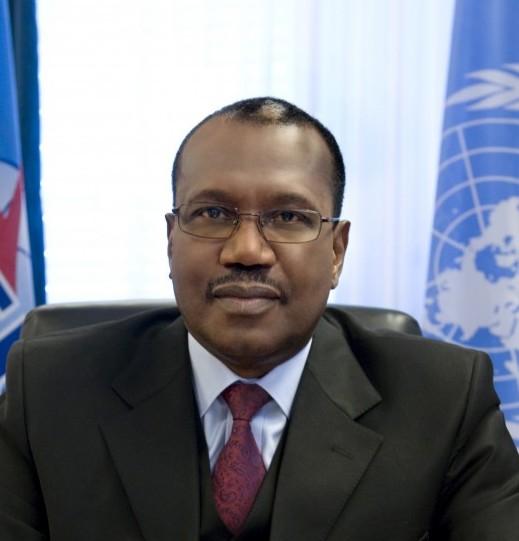
Dr. Hamadoun Touré
Secretary General
Dr. Hamadoun Touré, Secretary-General of the International Telecommunication Union (ITU) since January 2007, was reelected for a second four-year term in October 2010. As Secretary-General, Dr. Touré is committed to ITU’s mission of connecting the world, and to helping achieve the Millennium Development Goals through harnessing the unique potential of Information and Communication Technologies (ICTs).
A long-standing champion of ICTs as a driver of social and economic development, Dr. Touré previously served as Director of ITU’s Telecommunication Development Bureau (BDT) from 1998-2006. In this role he placed considerable emphasis on implementing the outcomes of the World Summit on the Information Society (WSIS), launching projects based on partnerships with international organizations, governments, the private sector and civil society. Dr. Touré started his professional career in his native Mali in 1979. He built a solid career in the satellite industry, serving as managing engineer in Mali’s first International Earth Station. He joined Intelsat’s Assistance and Development Programme in 1985. He was appointed Intelsat’s Group Director for Africa and the Middle East in 1994, earning a reputation as an energetic leader through his commitment to various regional connectivity projects such as RASCOM. In 1996 he joined ICO Global Communications as African Regional General Manager, spearheading the companies’ activities across the African region.
A national of Mali, Dr. Touré holds a Masters Degree in Electrical Engineering from the Technical Institute of Electronics and elecommunications of Leningrad, and a Ph.D from the University of Electronics, Telecommunications and Informatics of Moscow. He is married with four children and two grandchildren, and is proficient in four official ITU languages: English, French, Russian and Spanish.
Following is the text of a very importent and informative question and answer session with Dr. Hamadoun Toure for the interest of Teletimes’ readers:
Q – The Arab region has made extraordinary progress in mobile connectivity. What are the next challenges?
A – There’s no doubt that right across the region, the technology of choice is mobile. ITU statistics show that, between 2006 and 2011, the number of mobile cellular subscriptions in the Arab States soared from 126 million to almost 350 million. This represents nearly 97 subscriptions for every 100 people, ahead of the world average penetration rate of some 87 per cent. The challenge now, of course, is to do for the Internet and broadband what we have so successfully achieved with mobile.
Fixed-broadband Internet subscriptions remain limited in the Arab States, with only 2.2 connections per 100 inhabitants, compared to the world average of 8.5 per cent. It’s worth remembering that this does equate to eight million fixed broadband subscriptions, massively up from one million in 2006 – so we have made good progress. But there’s still far to go.
To address this challenge, the ITU has been working with governments and other partners on a wide range of initiatives to improve the global accessibility of broadband ICT infrastructure and services, and to decrease the cost of such access. One of the most important of these has been the launch in 2010 of the Broadband Commission for Digital Development, which is co-chaired by President Kagame of Rwanda and Carlos Slim of Mexico, with myself and the Director-General of UNESCO serving as co-vice-chairs.
At the most recent meeting of the Commission in Geneva in October 2011, just ahead of ITU’s Broadband Leadership Summit, the Commission announced a set of four new targets that countries around the world should strive to meet in order to ensure their populations fully participate in tomorrow’s emerging Knowledge Societies.
The following new targets cover broadband policy, affordability and uptake:
1 Making broadband policy universal. By 2015, all countries should have a national broadband plan or strategy or include broadband in their Universal Access / Service Definitions.
2 Making broadband affordable. By 2015, the cost of entry-level broadband services should amount to less than 5{e1f18614b95d3cd6e4b3128e1cd15d99b042a60a5a19c19b7a8e07e7495efa10} of average monthly income.
3 Connecting homes to broadband. By 2015, 40{e1f18614b95d3cd6e4b3128e1cd15d99b042a60a5a19c19b7a8e07e7495efa10} of households in developing countries should have Internet access.
4 Getting people online. By 2015, Internet user penetration should reach 60{e1f18614b95d3cd6e4b3128e1cd15d99b042a60a5a19c19b7a8e07e7495efa10} worldwide, 50{e1f18614b95d3cd6e4b3128e1cd15d99b042a60a5a19c19b7a8e07e7495efa10} in Developing countries and 15{e1f18614b95d3cd6e4b3128e1cd15d99b042a60a5a19c19b7a8e07e7495efa10} in Least Developed Countries (LDCs).
I believe these targets are ambitious but achievable, given the political will and commitment on the part of governments, working in partnership with the private sector. ITU will undertake responsibility for measuring each country’s progress towards the targets, producing an annual broadband report with rankings of nations worldwide in terms of broadband policy, affordability and uptake.
The Commission also endorsed a ‘Broadband Challenge’ which recognizes communication as ‘a human need and a right’, and calls on governments and private industry to work together to develop the innovative policy frameworks, business models and financing arrangements needed to facilitate growth in access to broadband worldwide.
Q – How do you look at the role of digital dividend in overcoming the digital divide, particularly in terms of broadband?
A – The digital dividend opens up many opportunities
to use the freed spectrum for other services or applications. It can be used by broadcasting services – for example, to cover provision of more programmes, high definition or 3D TV, or mobile television. It can also be used by other types of services in a frequency band which could be shared with
broadcasting (for example, short-range devices, such as wireless microphones used in theatres or during public events). And it could also be used in a distinct, harmonized frequency allocation for cellphones enabling ubiquitous service provision, universally compatible equipment and international roaming.
A harmonized approach is required to release UHF spectrum internationally (particularly if it is to be used for mobile service), to ensure a wide availability of devices at reasonable cost. Further harmonized mobile spectrum in the UHF frequency range is foreseen for IMT networks, and also to fulfill the future spectrum requirements for specialist users such as public safety providers.
Providing sufficient spectrum to support the growth of mobile broadband services is clearly a major priority, because broadband is such a powerful enabler, and because mobile access will continue to dominate as the platform of choice in a great many countries worldwide. Broadband has the potential to massively expand the effective delivery of vital services such as healthcare and education, to geographically distributed populations which could never be properly served by traditional, centralized models.
Expanded access to ICTs is already bringing services such as mobile banking to tens of millions of people in the developing world, giving them the kind of financial power to manage their lives which they have never before had.
Access to mobile networks is now available to 90{e1f18614b95d3cd6e4b3128e1cd15d99b042a60a5a19c19b7a8e07e7495efa10} of the world population and 80{e1f18614b95d3cd6e4b3128e1cd15d99b042a60a5a19c19b7a8e07e7495efa10} of the population living in rural areas.
More people are now moving from 2G to 3G platforms, in both developed and developing countries. More than 140 countries are offering 3G services, compared to just 95 countries three years ago. However, the majority of countries that have not yet launched 3G services are in Africa and the Arab States. In addition, to encourage more people to get online we also need to ensure the availability of relevant content in local languages.
Q – How do you look at the ICTs as a driver of social and economic development?
A – People in the poorest countries are now benefiting enormously from the mobile cellular miracle. As we all know, ICTs are essential in helping us accelerate progress towards meeting the Millennium Development Goals. This was clearly recognized by the World Summit for the Information Society in 2005, and by the LDC 4 conference in Istanbul last year. In 2001, the LDC 3 conference’s Brussels Programme of Action called for average telephone density in LDCs to be increased to five main lines per 100 inhabitants, and for Internet connections to be increased to ten users per 100 inhabitants.
Let me put these targets into context. At the time of LDC 3, the combined average teledensity – fixed plus mobile – in LDCs had reached 1.17{e1f18614b95d3cd6e4b3128e1cd15d99b042a60a5a19c19b7a8e07e7495efa10}. As a contrast, combined teledensity across all developing countries – including powerhouses such as China – had reached almost 17{e1f18614b95d3cd6e4b3128e1cd15d99b042a60a5a19c19b7a8e07e7495efa10}.
At the same time, in LDCs there were just three Internet users for every 1,000 inhabitants. The developing country average was almost ten times higher, at 28 users per 1,000 inhabitants.
Q – Where are we today, ten years later?
A – By the beginning of last year, average mobile cellular teledensity in LDCs had already surpassed 25{e1f18614b95d3cd6e4b3128e1cd15d99b042a60a5a19c19b7a8e07e7495efa10}, and was continuing to grow fast.
The percentage of Internet users in LDCs – at 2.5{e1f18614b95d3cd6e4b3128e1cd15d99b042a60a5a19c19b7a8e07e7495efa10} – is also encouraging, even if more progress needs to be made.
People ask if low Internet penetration really such a high priority, when people in LDCs face a daily lack of safe drinking water, rising food prices, and a chronic shortage of healthcare?
My answer is a resounding yes. Because technology really does have the power to radically transform lives. Particularly in the developing world, and particularly in countries with large rural and remote populations.
Q – Please tell us about some of the ITU’s key projects and its collaboration and partnerships with international organizations, governments, the private sector and civil society.
A – The ITU has a very long tradition of implementing
projects in the area of ICT for Development, and collaborates with a wide variety of stakeholders and funding partners, including government ministries, NGOs, financial institutions and pan-governmental bodies like the European Commission and the League of Arab States.
During ITU’s World Telecommunication Development Conference in Hyderabad (2010), a broad framework of priority areas for development to be addressed within each of the six ITU regions – Americas, CIS, Asia-Pacific, Arab Region, Africa and Europe – were adopted as Regional Initiatives. For the Arab States, the following five Regional Initiatives were adopted:
● Broadband access network
● Digital broadcasting
● Open-source software
● Arabic digital content
● Cyber security
Examples of recent and ongoing projects include:
● Establishment of Harmonized Policies for the ICT Market in the ACP
Targeting countries in Africa, the Caribbean and the Pacific, this project is being carried out with funding from ITU and the European Commission, and aims at developing and promoting harmonized policies and guidelines for the ICT market as well as building human and institutional capacity in the field of ICT through a range of targeted training, education programs and knowledge sharing measures.
● ITU Wireless Broadband Initiative
ITU launched the Wireless Broadband Initiative to support wireless broadband connectivity and ICT applications development all over the world. Particular focus is on selected public institutions in capitals and major cities (such as schools, municipalities, hospitals) and for under served populations in rural and remote areas in least developed and developing countries. ITU has been implementing several wireless broadband connectivity projects on a regional basis, and now is looking for partners to extend these projects to a global level and to achieve the aim of connecting the world. The Susan & Craig Mc Caw Foundation is the key partner of ITU in the implementation of this first phase, covering six countries (Burundi, Djibouti, Mali, Burkina Faso and Rwanda).
● ITU-Luxembourg telecommunications for disaster response
ITU and the Government of the Grand-Duchy of Luxembourg are cooperating on strengthening emergency telecommunications and rapid response in the event of natural disasters. The Government of Luxembourg has developed a nomadic satellite-based telecommunication system – ‘emergency.lu’ – aimed at assisting humanitarian agencies respond to communities affected by natural disasters, conflicts or protracted crises. This platform is available as a global public good to the international humanitarian community, with Luxembourg funding its development, implementation, operation and
● ITU-Anatel Cooperation Project
ITU has partnered with Brazilian regulator Anatel to help the agency create a new Cost Model that will assist in setting tariffs for fixed telephony and calculating industry standard reference values for mobile and leased line services. The new Cost Model will provide access to information management costs of the different business areas and product lines of telecommunications service providers, and improve the overall regulation of the sector. The cost model represents a key element in helping Anatel ensure compliance with Brazil’s public sector policies.
maintenance. Under the umbrella of the ‘ITU Framework for Cooperation in Emergencies’ (IFCE), ITU will encourage its 193 Member States to use the ‘emergency.lu’ platform and facilitate the rapid deployment of emergency telecommunication systems in the event of a sudden-onset disaster, or a longer-term deployment in chronic or recurrent humanitarian contexts or as part of a preparedness strategy in developing countries.
● ITU-Australian government projects for supporting Asia-Pacific regional initiatives
The projects funded by the Australian Government (Department of Broadband, Communications and the Digital Economy) and implemented by ITU have focused on ICT development areas ranging from policy and regulatory matters to technologies and infrastructure development, as well as human capacity building. They have created significant impact in the enabling environment in various countries especially LDCs and SIDS.
Q – What else is ITU doing to contribute towards achieving its goal of connecting the world?
A – In order to ensure countries are properly skilled and prepared for broadband network installation and management, capacity building will also be hugely important. ICT is the economic sector that continues to generate the majority of the new jobs worldwide, and countries must ensure they are well-positioned to harness new opportunities by creating a strong ICT skill base, especially among young people. Skills development has long been a key ITU priority, spanning a wide range of different training and education initiatives designed to build capacity across all social strata.
Our Telecommunication Development Bureau (BDT) is now streamlining its extensive ICT training efforts through its ITU Academy initiative. The vision of ITU Academy is to
strengthen the human, institutional and organizational capacity of developing countries by making available ICT learning and development opportunities at the highest possible levels of quality.
Supporting the ITU Academy initiative are a number of front-line training partners including the ITU’s Centres of Excellence and Internet Training Centres — all key players in delivering education, training and information in the different world regions.
To date, ITU has contributed more than US$10 million in seed funding to help set up over 60 Centres of Excellence in regions around the world. These offer continuous education to senior ICT managers in the public and private spheres through face-to-face or distance learning programmes. They also serve as regional focal points for professional development, research, and knowledge sharing, and specialist training services for external clients.
Complementing the Centres of Excellence, our Internet Training Centres initiative is helping developing countries build their own pool of ‘new economy’ professionals who will drive ongoing ICT growth at a local level. ITU has so far helped establish some 80 ITCs in over 60 nations, many of which are UN-designated Least Developed Countries.
Q – Net neutrality is currently one of the vital issues that are being discussed around the world in different countries. Please share your thoughts on this, and how do you look at net neutrality in the near future.
A – The important issue of net neutrality was addressed by ITU’s Global Symposium for Regulators in both 2009 and 2010. The regulators participating in these GSR adopted the following best practice guidelines:
● Regulators may consider developing adequate provisions both in the fixed and the mobile Internet access services to ensure network neutrality.
● With regard to Internet traffic management, only objectively justifiable differentiations be made in the way in which various data streams are treated, whether according to the type of content, the service, application, device or the address of the stream’s origin or destination.
● When Internet Service Providers (ISPs) do employ traffic management mechanisms for ensuring access to the Internet at any point of the network, they comply with the general principles of relevance, proportionality, efficiency, non¬discrimination between parties and transparency.
In addition, ITU believes that to ensure reasonable traffic management practices, regulators should take measures such as:
● Considering implementing measures for ISPs to disclose information concerning network management, quality of service and other practices as is reasonably required for subscribers and content, application, and service providers.
● Allowing clients to quickly end their contracts without high switching costs .
● Allowing clients to prescribe minimum quality of service for Internet access.
● Creating policy directives stating the rights of consumers to access any lawful content, applications, and services over their Internet connections.
As this remains a vital issue being discussed worldwide, net neutrality will again be one of the topics to be addressed by the next GSR, to be held in Sri Lanka from 3- 5 October 2012. The event will throw the spotlight on traffic management, transparency and QoS prioritization in light of the use of new services, applications and cloud computing services, and the strains on existing bandwidth.
Q – Please tell us about ITU¬IMPACT initiative.
A – ITU-IMPACT is the first truly global multi-stakeholder and public–private alliance against cyberthreats. It provides ITU’s 193 Member States and others with the expertise, facilities and resources to effectively enhance the global community’s capability and capacity to prevent, defend against and respond to cyberthreats. As of today, 137 countries are already formally part of the ITU-IMPACT operational deployment. We have performed readiness assessments in many countries, with a number now moving to the implementation phase. We are also delighted to be providing a number of specific cyber security services to the United Nations family.
Q – What support ITU can provide to set international policies and standards, and to build an international framework of norms and principles for cyber security and cyber peace?
A – As a specialized agency, the International Telecommunication Union (ITU) provides a global forum for discussing cyber security. ITU has been appointed as the sole facilitator of the WSIS Action Line C5, ‘Building confidence and security in the use of ICTs’ and has been entrusted by world leaders to facilitate international dialogue and cooperation.
Recognizing the growing risk of a cyber attack that could originate anywhere and affect every nation, we propose five guiding principles for establishing and protecting peace in the emerging cyber world:
● Every government should commit itself to giving its people access to communications.
● Every government will commit itself to protecting its people in cyberspace.
● Every country will commit itself not to harbor terrorists/criminals in its own territories.
● Every country should commit itself not to be the first to launch a cyber-attack on other countries.
● Every country must commit itself to collaborate with each other within an international framework of co-operation to ensure that there is peace in cyberspace.
The ITU is uniquely positioned to facilitate global dialogue among all stakeholders, as it is doing for spectrum allocation and for the International Telecommunication Regulations (ITRs). The borderless nature of cyber security requires global discussion, and only global organizations such as the UN (and ITU as its specialized agency) can ensure that agreement and consensus is achieved.
May 17, 2025











